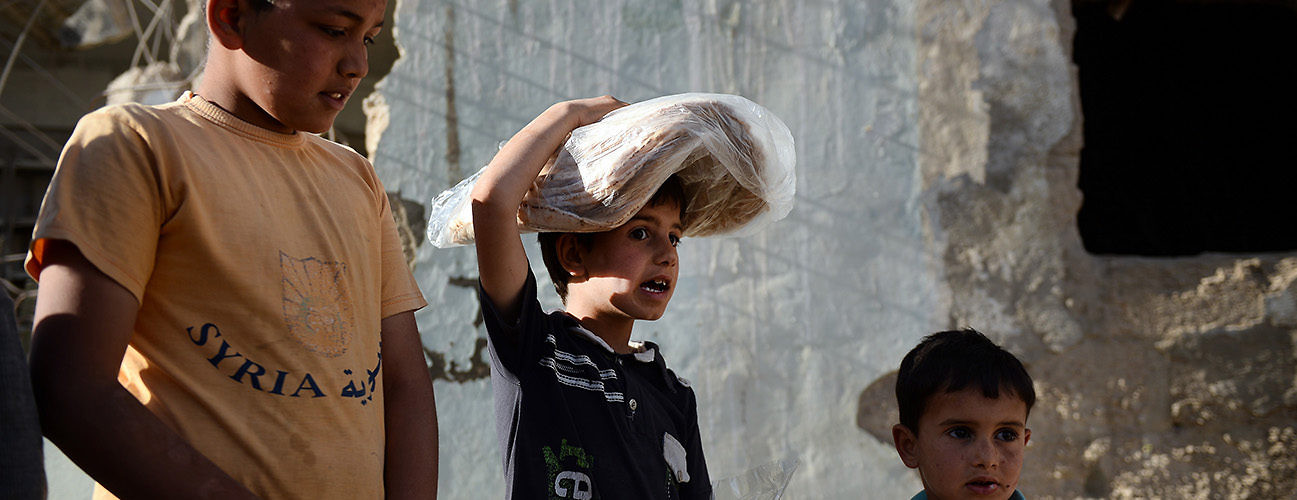Children caught in the Syrian crisis receive humanitarian aid. Kaukab, Syria, May 4, 2016. (Maksim Blinov/Sputnik/AP)
World leaders will gather in Istanbul from May 23-24th for the first ever World Humanitarian Summit (WHS), convened by United Nations Secretary-General Ban Ki-moon. When the Secretary-General’s report for the summit was released earlier this year, it took a few people in the humanitarian sector by surprise. Many stakeholders had expected a vision for the future of humanitarian action. Instead, it addressed the world’s collective responsibility to humanity.
This unexpected turn led to criticisms and at least one ostentatious pull-out from the WHS. These critics contend that the summit process has lost its way; that humanitarians themselves are being crowded out by bigger actors—political actors, peacebuilders, climate change warriors, and sustainable developers. But the critics have lost sight of the key message of the summit in the Secretary-General’s report: the plight of the people in humanitarian crises is not a fallout from global affairs; it is a global affair. Humanitarian concerns must be put among the critical global challenges of our times.
The Secretary-General did not have to repeat, as many humanitarians do, that “there is no humanitarian solution to humanitarian problems.” He instead directly engaged UN member states on potential political solutions. He did not shy away from confronting the geopolitics and the conduct of conflict that have perpetrated untold misery.
In this respect, the Secretary-General has gone further than the discourse of the global consultation for the WHS, which centered around principled humanitarian action and humanitarian effectiveness. He also established the WHS as a last step in a “summit series” which included events in Paris on climate change, Sendai on reducing disaster risks, and New York on sustainable development. Pointing to the inadequate results of extant multi-year crisis management and relief approaches, he was asking the world to look not only to humanitarian action and actors but beyond for solutions to humanitarian problems.
At the same time, in closely linking the WHS Agenda for Humanity to the 2030 Agenda for Sustainable Development and Sendai Framework, the Secretary-General’s report adopted a language of “vulnerability” and “risk”—rather than “suffering”— especially in sections more pertinent to humanitarian actors. This irked classical humanitarians, who felt that it was chipping at their existential core, namely their obligation to alleviate human suffering and to maintain human dignity in acute situations. It did not help that there was only one paragraph in the report and one bullet point in the Agenda for Humanity pertaining to “emergency capacity.” Moreover, there have been expressions of disappointment, or perhaps relief from some less conducive to change, that the WHS is set to avoid addressing the crumbling international humanitarian (eco)system.
These criticisms notwithstanding, it is clear that there are some humanitarian solutions to some humanitarian problems.
The task of tackling a number of efficiency issues—many of them age-old, such as needs assessments and financial transparency—are now to be taken up by the so-called “grand bargain” negotiation between the major humanitarian donors and agencies, which has become an important plank of the WHS. This does not, however, address many of the structural and systemic cultural problems that have been well documented, including by recent reports of the Active Learning Network on Accountability and Performance and the Overseas Development Institute. These include, among others, the outsized dominance, through increasing competitiveness, of just a handful of UN agencies and international NGOs who, in the main, continue to provide what they have, rather than what crisis-affected people need or want.
Solving these problems will require monumental changes in mindset on the part of humanitarians, from supply-driven aid to putting crisis-affected people as front-of-mind and their needs as the starting point of all planning and programming. In fact, the need for this change was a consensus of the WHS global consultation. This is what organizations—whether international, national, or local; whether public, non-profit, or private—should sign up to at the WHS, even if it means making commitments that do not exactly conform to the suggested wordings provided by the summit’s secretariat.
The format of the WHS provides many occasions for any organization to state its intention to conduct humanitarian action differently. This is possible whether the issue is “empowering crisis-affected people,” “putting protection in the center,” “local first—international when necessary,” “partnerships” or any of the issues that received broad support in the global consultation process. As for donor states, they can announce grand bargain commitments not only to increase efficiency but to redirect organizational behavior.
The Secretary-General has provided a vision and the WHS is certainly asking a lot. The change from an expected post-2016 humanitarian agenda to an agenda for humanity came very late in the preparatory calendar. Summit participants will have to dig ever deeper inside themselves if they truly grasp the plight of crisis-affected people. It waits to be seen whether WHS participants will take shelter in the path of least resistance or, worse, continuing self-interest, or whether they can bravely take their responsibility to humanity seriously and commit to solutions to humanitarian problems.
Catherine Bragg is Adjunct Full Professor of Humanitarian Action at University College Dublin and a former UN Assistant Secretary-General for Humanitarian Affairs.
